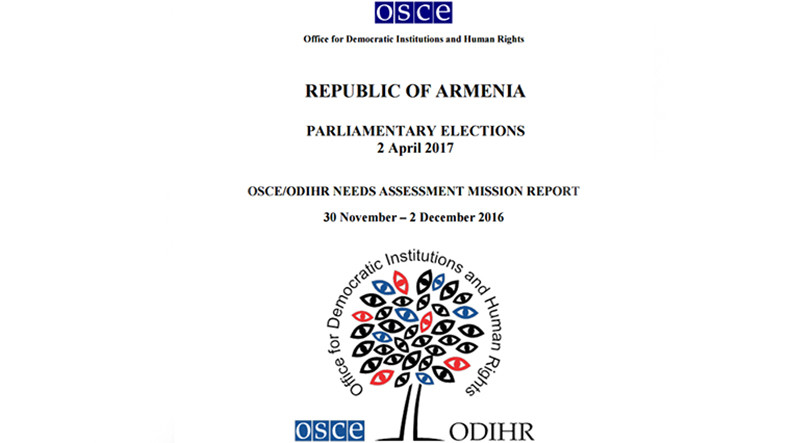
ODIHR report states Electoral Code of Armenia addressed many previous recommendations
ODIHR report states Electoral Code of Armenia addressed many previous recommendationsIn accordance with its mandate, the OSCE Office for Democratic Institutions and Human Rights (OSCE/ODIHR) undertook a Needs Assessment Mission (NAM) from 30 November to 2 December 2016 in Armenia.
The purpose of the mission was to assess the pre-election environment and the preparations for the elections.
The assessment http://www.osce.org/odihr/elections/armenia/293546?download=true, published on the OSCE official website, states that following constitutional amendments, endorsed by voters in a referendum in December 2015, Armenia is transitioning from a semi-presidential to a parliamentary political system. The changes considerably reduce the powers of the president in favour of the prime minister and the parliament.
“The new electoral system is complex with 101 MPs elected through a two-tier proportional system that includes national and district candidates. An additional four seats are reserved for national minorities. With a view to ensuring a stable parliamentary majority, the winning list may be assigned additional seats,” the report reflects on the changes.
The authors of the assessment note that elections in Armenia are regulated by the new Constitution and the newly adopted Electoral Code. “Importantly, the electoral reform was the result of a largely inclusive public discussion and broad political support. Most OSCE/ODIHR NAM interlocutors largely welcomed the legal amendments, viewing it as a positive development in building public confidence ahead of the elections. The newCode addressed many previous OSCE/ODIHR recommendations, including those related to voter lists and identification, women’s representation as candidates, complaints and appeals, and rules on campaign and campaign finance,” says the assessment.
The document, compiled by Dr. Richard Lappin, Deputy Head of the OSCE/ODIHR Election Department, and Mr. Alexey Gromov, OSCE/ODIHR Election Adviser as well as d by Mr. Loïc Poulain, OSCE Parliamentary Assembly Programme Officer, however, notes htat some recommendations remain unaddressed, particularly “related to constitutional restrictions on candidacy and electoral thresholds.
”To remind, ahead of the adoption of the Armenia’s Electoral Code negotiations in the 4+4+4 format, where the government, opposition and NGOs represented by four delegates where launched. One of the demands of the opposition was post-election publication of voter lists that was eventually accepted by the government after number of negotiation rounds.
Newsfeed
Videos






























